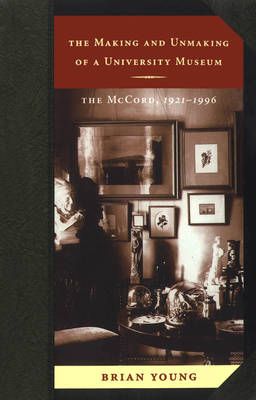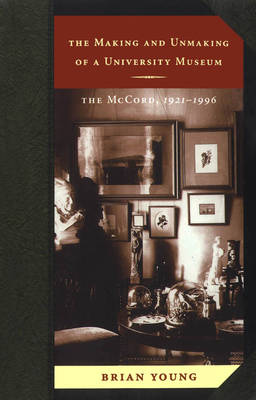
Bedankt voor het vertrouwen het afgelopen jaar! Om jou te bedanken bieden we GRATIS verzending (in België) aan op alles gedurende de hele maand januari.
- Afhalen na 1 uur in een winkel met voorraad
- Gratis thuislevering in België vanaf € 30
- Ruim aanbod met 7 miljoen producten
Bedankt voor het vertrouwen het afgelopen jaar! Om jou te bedanken bieden we GRATIS verzending (in België) aan op alles gedurende de hele maand januari.
- Afhalen na 1 uur in een winkel met voorraad
- Gratis thuislevering in België vanaf € 30
- Ruim aanbod met 7 miljoen producten
Zoeken
The Making and Unmaking of a University Museum
The McCord, 1921-1996
Brian J Young, Brian Young
Paperback | Engels
€ 36,45
+ 72 punten
Uitvoering
Omschrijving
Museums and cultural institutions across North America and Europe are being transformed by budget cuts, re-evaluation of their cultural missions, evolving concepts of museology, and changing audiences, making Brian Young's trenchant history of a prestigious university museum, Montreal's McCord Museum of Canadian History, especially pertinent. In The Making and Unmaking of a University Museum Young elucidates the relationship between museums and communities by examining the nineteenth-century social context of the family who bequeathed their collection to McGill University and the collection's fate in an academic institution. Tracing the museum's history from its founding by David Ross McCord, he emphasizes the centrality of elite women to the culture of the museum and its survival in the twentieth century, the museum's importance as the collective memory of Montreal's English-speaking elite, and the difficulty academic historians have had in dealing with material history. He recounts a sorry tale of mismatched institutional and intellectual cultures that culminated in the university's transfer of custodial responsibility to a corporate museum board and the collapse of the museum's central research and conservation mandates. The Making and Unmaking of a University Museum reveals the complex and often conflicting relationships between private collectors, curators, museum and university officials, volunteers, researchers, philanthropic foundations, the state, and the public. It shows how the makeup, interests, and perspectives of these groups have changed over the course of the century, leading to the current crisis in which many museums are forced to function according to a corporate culture in which the dictates of audience size, marketing, and public relations experts dominate the priorities of curators and collections, the needs of scholars and students, and the interests of communities. Young exposes the present-day conflict between cultural institutions operating ahistorically and often without any social vision and a public demanding greater help in understanding the past. It will be of interest to everyone who cares about culture, museums, and public memory.
Specificaties
Betrokkenen
- Auteur(s):
- Uitgeverij:
Inhoud
- Aantal bladzijden:
- 208
- Taal:
- Engels
Eigenschappen
- Productcode (EAN):
- 9780773520509
- Verschijningsdatum:
- 15/05/2000
- Uitvoering:
- Paperback
- Formaat:
- Trade paperback (VS)
- Afmetingen:
- 141 mm x 217 mm
- Gewicht:
- 335 g

Alleen bij Standaard Boekhandel
+ 72 punten op je klantenkaart van Standaard Boekhandel
Beoordelingen
We publiceren alleen reviews die voldoen aan de voorwaarden voor reviews. Bekijk onze voorwaarden voor reviews.









